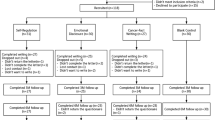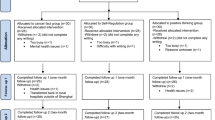Abstract
Purpose
Among Chinese breast cancer survivors, treatment decision-making is different than that in western countries. Among Chinese women, family often plays an important role during the treatment period, and Chinese-specific cultural factors have negative influences on their psychological conditions. The aim of the present study was to explore the treatment decision making, family influences, and cultural influences of Chinese breast cancer survivors.
Methods
This study used an expressive writing method to explore the experiences of breast cancer survivors who were diagnosed with stage 0 to III cancer. Participants were instructed to write 30 min per week over a period of 3 weeks. All writings were analyzed using a qualitative method.
Results
Three themes were identified: treatment decision making, family influences, and cultural influences. Treatment decision-making included the subthemes of preference for mastectomy, passive involvement, and active involvement. Family influences included the subthemes of financial burden, family expectations, and family support. Cultural influences included the subthemes of fatalism, barriers to expressing emotions, and stigma related to cancer.
Conclusions
Information on breast cancer treatment and survivorship should be provided to patients through multiple methods to improve their knowledge of breast cancer. Family support should be maintained to ensure patients’ confidence and courage during the treatment period. Necessary and appropriate psychological interventions that consider cultural influences should be administered.
Similar content being viewed by others
References
Chen W, Zheng R, Baade PD, Zhang S, Zeng H, Bray F, Jemal A, Yu XQ, He J (2016) Cancer statistics in China, 2015. CA cancer j clin 66:115–132
Zuo TT, Zheng RS, Zeng HM, Zhang SW, Chen WQ (2017) Female breast cancer incidence and mortality in China, 2013. Thorac cancer 8:214–218
Fan L, Strasser-Weippl K, Li JJ, St Louis J, Finkelstein DM, Yu KD, Chen WQ, Shao ZM, Goss PE (2014) Breast cancer in China Lancet Oncol 15:e279–e289
Lam WW, Fielding R (2003) The evolving experience of illness for Chinese women with breast cancer: a qualitative study. Psycho-oncology 12:127–140
Cheng H, Sit JWH, KKF C (2016) Negative and positive life changes following treatment completion: Chinese breast cancer survivors’ perspectives Supportive care in cancer:official journal of the Multinational Association. Support Care Cancer 24:791–798
Lee S, Chen L, Ma GX, Fang CY, Oh Y, Scully L (2013) Challenges and needs of Chinese and Korean American breast cancer survivors: in-depth interviews. N Am j med sci 6:1–8
Lu Q, Zheng D, Young L, Kagawa-Singer M, Loh A (2012) A pilot study of expressive writing intervention among Chinese-speaking breast cancer survivors Health psychology : official journal of the Division of Health Psychology. American Psychological Association 31:548–551
Lu Q, Yeung NC, You J, Dai J (2016) Using expressive writing to explore thoughts and beliefs about cancer and treatment among Chinese American immigrant breast cancer survivors. Psycho-oncology 25:1371–1374
Warmoth K, Cheung B, You J, NCY Y, Lu Q (2017) Exploring the social needs and challenges of Chinese American immigrant breast cancer survivors: a qualitative study using an expressive writing approach. Int j behav med 24:827–835
Giorgi A (1997) The theory, practice, and evaluation of the phenomenological method as a qualitative research procedure 28: 235
Killoran M, Moyer A (2006) Surgical treatment preferences in Chinese-American women with early-stage breast cancer. Psycho-oncology 15:969–984
Lam WW, Fielding R, Ho EY, Chan M, Or A (2005) Surgeon’s recommendation, perceived operative efficacy and age dictate treatment choice by Chinese women facing breast cancer surgery. Psycho-oncology 14:585–593
Zhang BL, Sivasubramaniam PG, Zhang Q, Wang J, Zhang B, Gao JD, Tang ZH, Chen GJ, Xie XM, Wang Z, Yang HJ, He JJ, Li H, Li JY, Fan JH, Wang X, Qiao YL (2015) Trends in radical surgical treatment methods for breast malignancies in China: a multicenter 10-year retrospective study. Oncologist 20:1036–1043
Kwok C, Koo FK (2017) Participation in treatment decision-making among Chinese-Australian women with breast cancer Supportive care in cancer: official journal of the Multinational Association. Support Care Cancer 25:957–963
Bennett K, Smith DH, Irwin H (1999) Preferences for participation in medical decisions in China Health Communication 11: 261-284
Wong-Kim E, Sun A, Merighi JR, Chow EA (2005) Understanding quality-of-life issues in Chinese women with breast cancer: a qualitative investigation. Cancer Control 12(Suppl 2):6–12
Carrera PM, Kantarjian HM, Blinder VS (2018) The financial burden and distress of patients with cancer: understanding and stepping-up action on the financial toxicity of cancer treatment. CA cancer j clin 68:153–165
Liao XZ, Shi JF, Liu JS, Huang HY, Guo LW, Zhu XY, Xiao HF, Wang L, Bai YN, Liu GX, Mao AY, Ren JS, Sun XJ, Mai L, Liu YQ, Song BB, Gong JY, Zhou JY, Du LB, Zhou Q, Cao R, Zhu L, Ren Y, Lou PA, Lan L, Sun XH, Qi X, Wang YZ, Zhang K, He J, Dai M (2018) Medical and non-medical expenditure for breast cancer diagnosis and treatment in China: a multicenter cross-sectional study. Asia Pac J Clin Oncol 14:167–178
Lu Q, Wong CC, Gallagher MW, Tou RY, Young L, Loh A (2017) Expressive writing among Chinese American breast cancer survivors: a randomized controlled trial Health psychology : official journal of the Division of Health Psychology. American Psychological Association 36:370–379
Kim S, Ko YH, Jun EY (2012) The impact of breast cancer on mother-child relationships in Korea. Psycho-oncology 21:640–646
Tam Ashing K, Padilla G, Tejero J, Kagawa-Singer M (2003) Understanding the breast cancer experience of Asian American women. Psycho-oncology 12:38–58
Simpson P (2005) Hong Kong families and breast cancer: beliefs and adaptation strategies. Psycho-oncology 14:671–683
Levkovich I, Cohen M, Karkabi K (2019) The Experience of fatigue in breast cancer patients 1-12 month post-chemotherapy: a qualitative study. Behav Med 45:7–18
Straughan PT, Seow A (1998) Fatalism reconceptualized: a concept to predict health screening behavior Journal of Gender. Culture and Health 3:85–100
Powe BD, Finnie R (2003) Cancer fatalism: the state of the science. Cancer Nurs 26:454–465 quiz 466-457
Shields CG, Morrow GR, Griggs J, Mallinger J, Roscoe J, Wade JL, Dakhil SR, Fitch TR (2004) Decision-making role preferences of patients receiving adjuvant cancer treatment: a university of Rochester cancer center community clinical oncology program. Support Cancer Ther 1:119–126
Wei M, Su JC, Carrera S, Lin SP, Yi F (2013) Suppression and interpersonal harmony: a cross-cultural comparison between Chinese and European Americans. J Couns Psychol 60:625–633
Lu Q, Gallagher MW, Loh A, Young L (2018) Expressive writing intervention improves quality of life among Chinese-American breast cancer survivors: a randomized controlled trial. Ann Behav Med 52:952–962
Else-Quest NM, LoConte NK, Schiller JH, Hyde JS (2009) Perceived stigma, self-blame, and adjustment among lung, breast and prostate cancer patients. Psychol Health 24:949–964
Nyblade L, Stockton M, Travasso S, Krishnan S (2017) A qualitative exploration of cervical and breast cancer stigma in Karnataka, India. BMC Womens Health 17:58
Zhang L, Gao J, Lin D, Xie L, Wang T, Zou L (2019) Personal factors influencing breast cancer patients’ perception of breast conservation surgery in west China. Ann Transl Med 7:313
Funding
This research is supported by the Shandong Education Department (J17RA137), Science and Technology Development Plan of Weifang (2015WS009, 2018YX003), Health and Family Planning Commission of Shandong Province (2017WS852), and Natural Science Foundation of Shandong Province ( ZR2016GM05).
Author information
Authors and Affiliations
Corresponding author
Ethics declarations
Conflict of interest
The authors declare that they have no conflict of interest.
Ethical approval
All procedures in studies involving human participants were conducted in accordance with the ethical standards of the Southern Adelaide Clinical Human Research Ethics Committee and with the 1964 Helsinki declaration and its later amendments or comparable ethical
standards.
Statement of informed consent
Informed consent was obtained from all individual participants included in the study.
Additional information
Publisher’s note
Springer Nature remains neutral with regard to jurisdictional claims in published maps and institutional affiliations.
Rights and permissions
About this article
Cite this article
Wang, L., Geng, X., Ji, L. et al. Treatment decision-making, family influences, and cultural influences of Chinese breast cancer survivors: a qualitative study using an expressive writing method. Support Care Cancer 28, 3259–3266 (2020). https://doi.org/10.1007/s00520-019-05161-w
Received:
Accepted:
Published:
Issue Date:
DOI: https://doi.org/10.1007/s00520-019-05161-w




